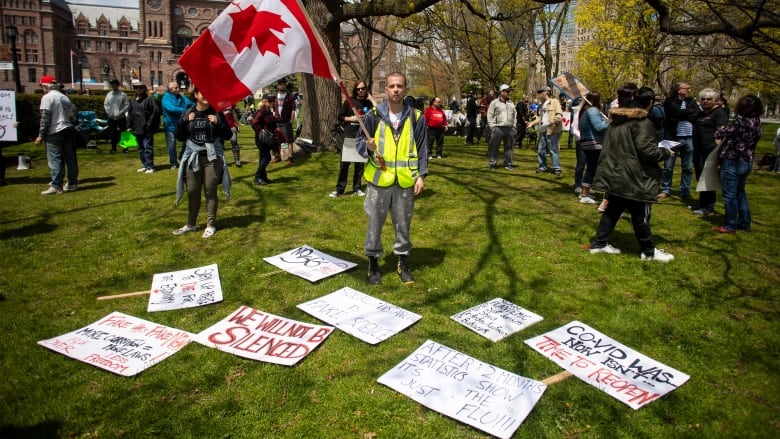Researchers say conspiracy theories about COVID-19 are spreading at an alarming rate across the country — and they warn misinformation shared online may lead to devastating consequences and push Canadians to shun important safety measures.

A lively crowd gathered outside François Legault’s office in downtown Montreal in mid-July to send a message to the Quebec premier: His government cannot force them to wear masks in indoor public spaces to fight the spread of COVID 19.
“Long live freedom without a mask,” read one sign at the rally, which drew several dozen people. “My body, my choice” read another, alongside a drawing of a medical mask with a line across it.
The anti-mask movement is not unique to Quebec, nor are masks the only source of conflict in the country when it comes to public health directives around the novel coronavirus. But the issue is one of several at the heart of a growing online movement of disinformation around the COVID-19 pandemic in Canada.
Researchers say conspiracy theories about COVID-19 are spreading at an alarming rate across the country — and they warn misinformation shared online may lead to devastating consequences and push Canadians to shun important safety measures.
“I think that people should be enormously concerned,” said Aengus Bridgman, a PhD candidate in political science at McGill University and co-author of a study published last month on COVID-19 misinformation and its impact on public health.
Social media can drive misinformation about COVID-19: study
The study found the more a person relies on social media to learn about COVID-19, the more likely they are to be exposed to misinformation and to believe it, and to disregard physical distancing and other public health guidelines.
About 16 per cent of Canadians use social media as their primary source of information on the virus, Bridgman said in a recent interview.
His research team surveyed nearly 2,500 people and examined 620,000 English-language Twitter accounts, but Bridgman said COVID-19 misinformation also spreads on other social media platforms, including Facebook, YouTube, Reddit, Instagram and Tumblr.
For example, a Facebook group called “Against mandatory mask-wearing in Quebec” has over 22,000 members to date, while another group with a similar mission has nearly 21,000 members.
People are dying because of these conspiracy theories and we’ve got to stop them.– Alison Meek, history professor at Western University.
The posts on these pages vary, from questioning the science behind wearing masks and lambasting Horacio Arruda, Quebec’s public health director, for the mandatory mask rule, to accusing the World Health Organization of bias and Microsoft founder and philanthropist Bil

